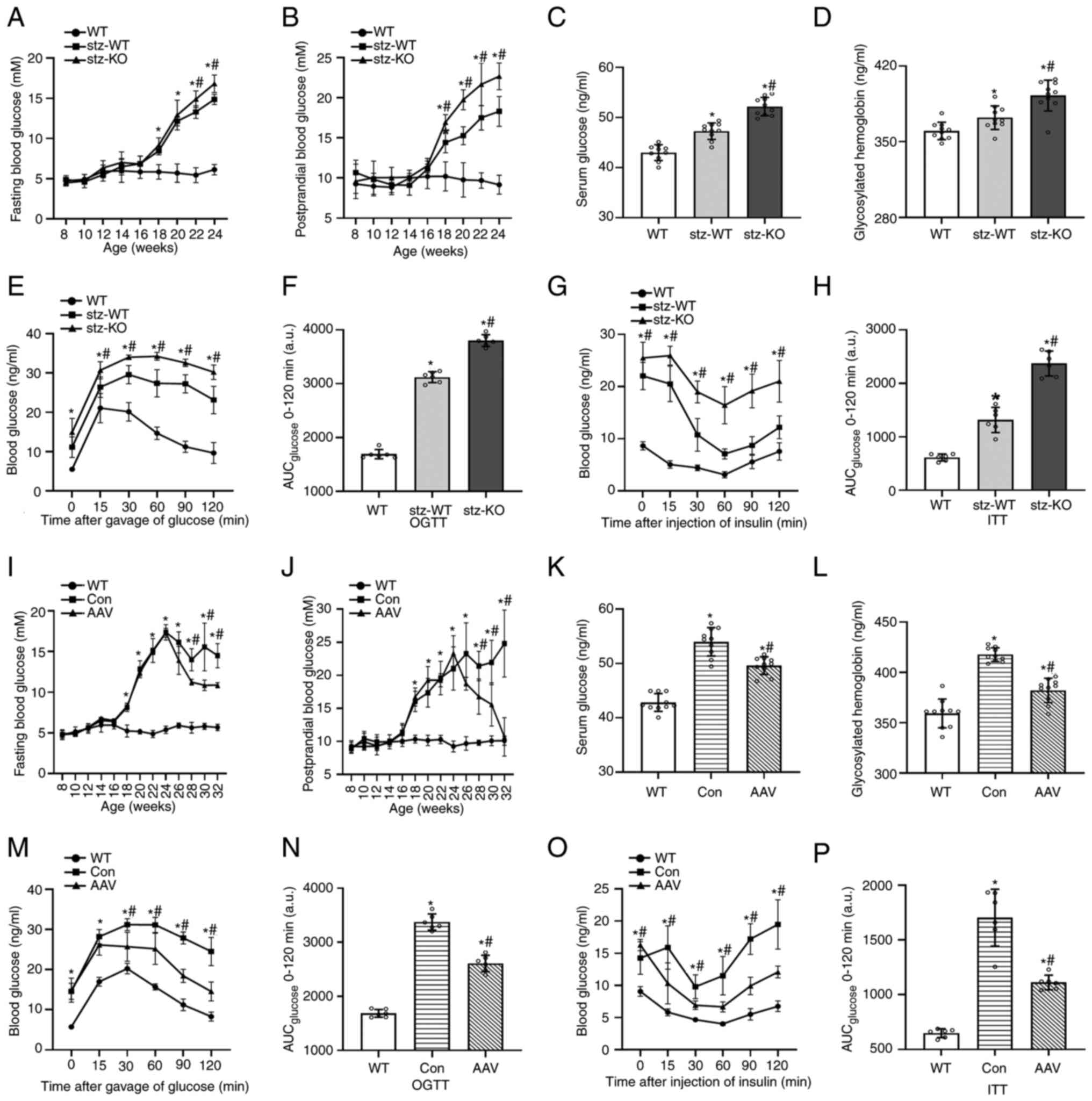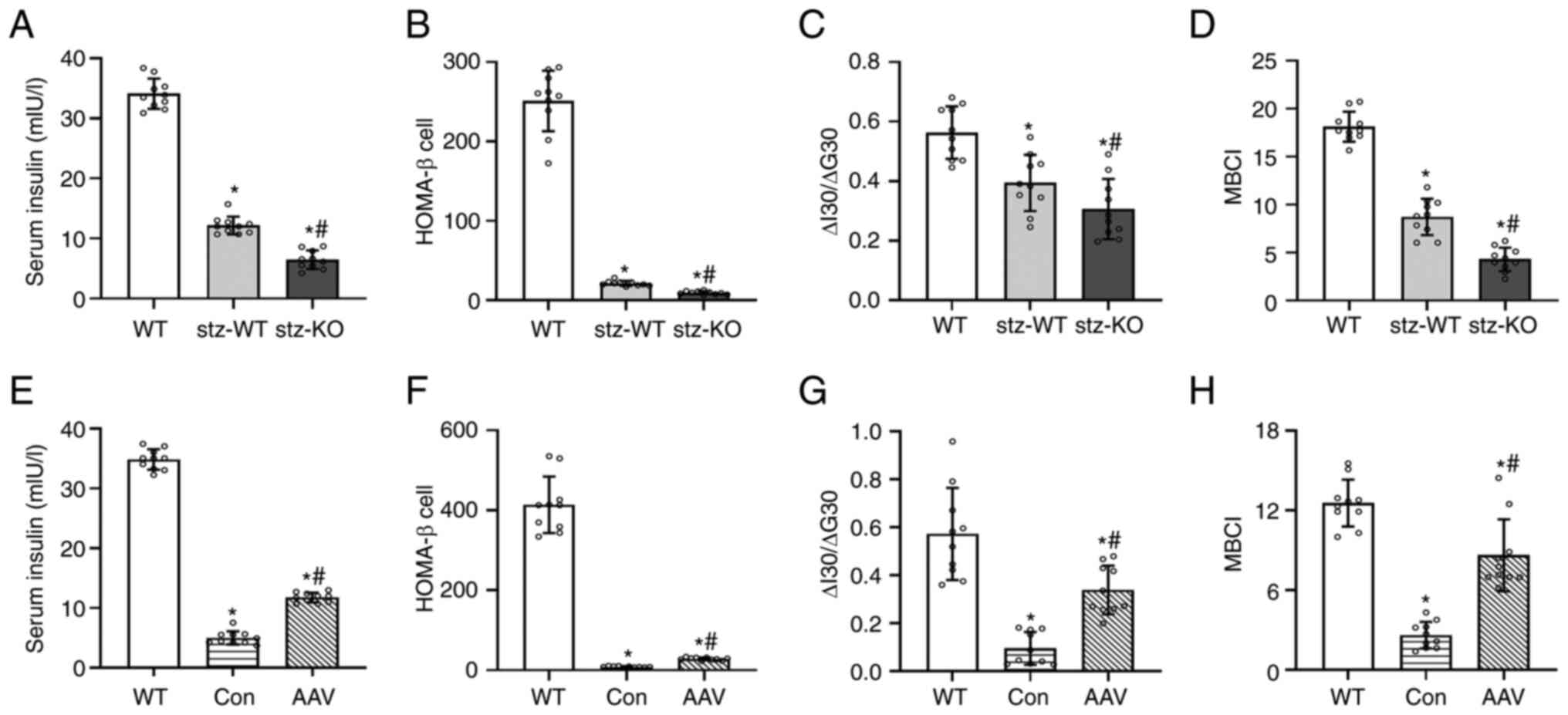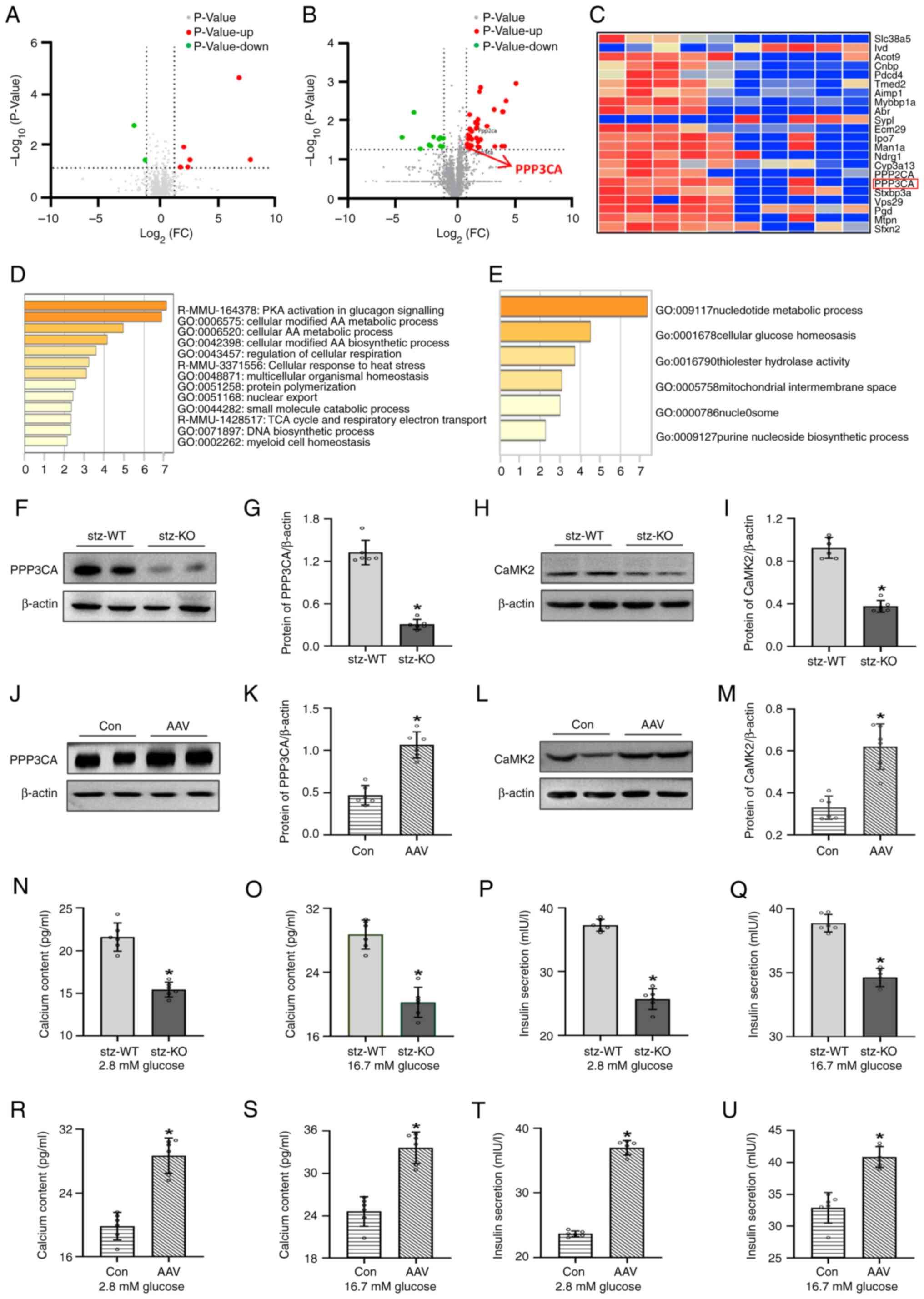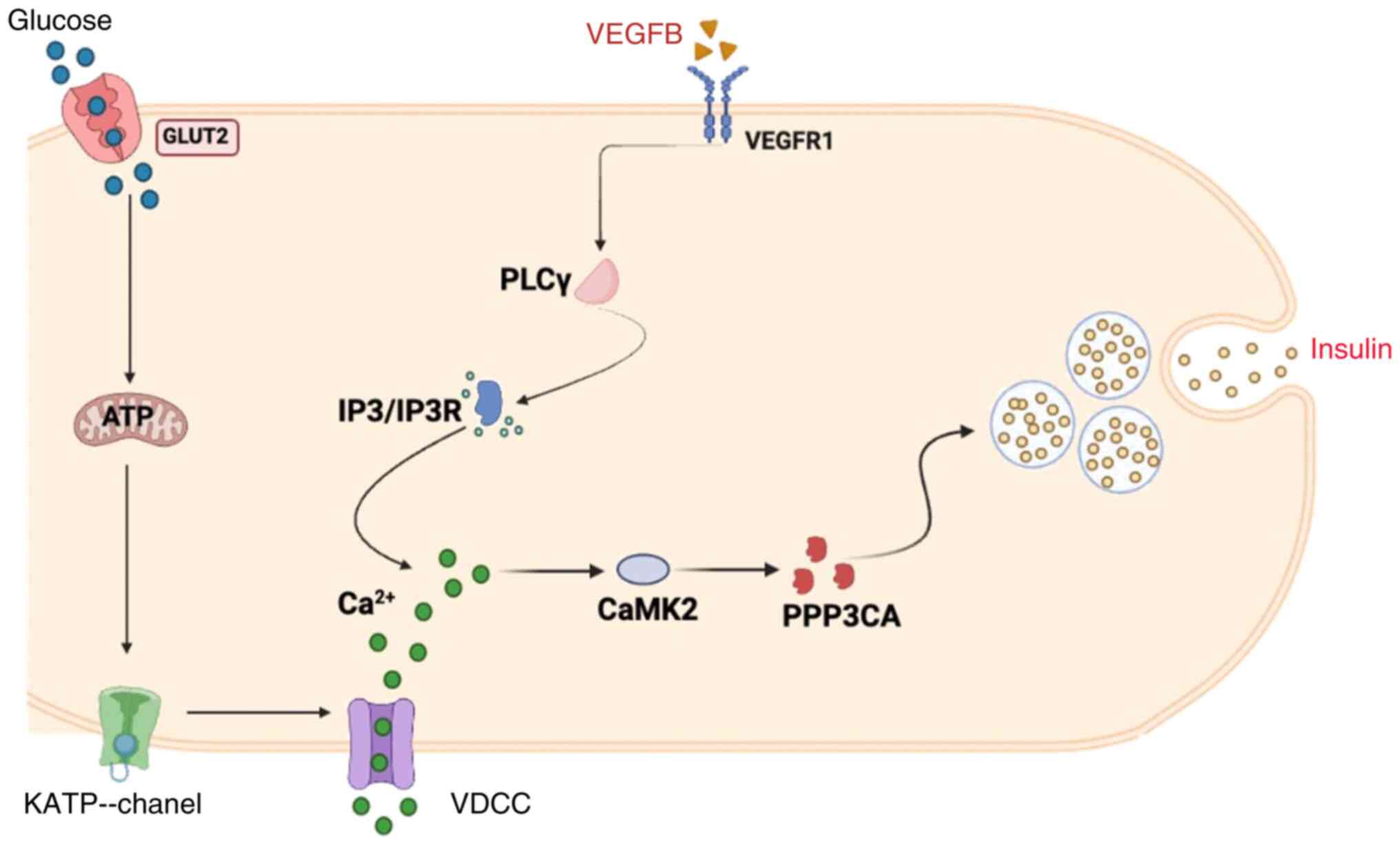|
1
|
Rorsman P and Braun M: Regulation of
insulin secretion in human pancreatic islets. Annu Rev Physiol.
75:155–179. 2013. View Article : Google Scholar : PubMed/NCBI
|
|
2
|
Cernea S and Dobreanu M: Diabetes and beta
cell function: From mechanisms to evaluation and clinical
implications. Biochem Med (Zagreb). 23:266–280. 2013. View Article : Google Scholar : PubMed/NCBI
|
|
3
|
Wu J, Wei H, Qu H, Feng Z, Long J, Ge Q
and Deng H: Plasma vascular endothelial growth factor B levels are
increased in patients with newly diagnosed type 2 diabetes mellitus
and associated with the first phase of glucose-stimulated insulin
secretion function of β-cell. J Endocrinol Invest. 40:1219–1226.
2017. View Article : Google Scholar : PubMed/NCBI
|
|
4
|
Ning FC, Jensen N, Mi J, Lindström W,
Balan M, Muhl L, Eriksson U, Nilsson I and Nyqvist D: VEGF-B
ablation in pancreatic beta-cells upregulates insulin expression
without affecting glucose homeostasis or islet lipid uptake. Sci
Rep. 10:9232020. View Article : Google Scholar : PubMed/NCBI
|
|
5
|
Shang R, Lal N, Lee CS, Zhai Y, Puri K,
Seira O, Boushel RC, Sultan I, Räsänen M, Alitalo K, et al:
Cardiac-specific VEGFB overexpression reduces lipoprotein lipase
activity 2 and improves insulin action in rat heart. Am J Physiol
Endocrinol Metab. 321:E753–E765. 2021. View Article : Google Scholar : PubMed/NCBI
|
|
6
|
Rorsman P and Ashcroft FM: Pancreatic
β-cell electrical activity and insulin secretion: Of mice and men.
Physiol Rev. 98:117–214. 2018. View Article : Google Scholar : PubMed/NCBI
|
|
7
|
Vishnu N, Hamilton A, Bagge A, Wernersson
A, Cowan E, Barnard H, Sancak Y, Kamer KJ, Spégel P, Fex M, et al:
Mitochondrial clearance of calcium facilitated by MICU2 controls
insulin secretion. Mol Metab. 51:1012392021. View Article : Google Scholar : PubMed/NCBI
|
|
8
|
Wiederkehr A and Wollheim CB: Minireview:
Implication of mitochondria in insulin secretion and action.
Endocrinology. 147:2643–2649. 2006. View Article : Google Scholar : PubMed/NCBI
|
|
9
|
Rask–Madsen C and King GL: Differential
regulation of VEGF signaling by PKC-alpha and PKC-epsilon in
endothelial cells. Arterioscler Thromb Vasc Biol. 28:919–924. 2008.
View Article : Google Scholar : PubMed/NCBI
|
|
10
|
Chen YH, Chang M and Davidson BL:
Molecular signatures of disease brain endothelia provide new sites
for CNS-directed enzyme therapy. Nat Med. 15:1215–1218. 2009.
View Article : Google Scholar : PubMed/NCBI
|
|
11
|
Corbett BF, You JC, Zhang X, Pyfer MS,
Tosi U, Iascone DM, Petrof I, Hazra A, Fu CH, Stephens GS, et al:
ΔFosB regulates gene expression and cognitive dysfunction in a
mouse model of Alzheimer's Disease. Cell Rep. 20:344–355. 2017.
View Article : Google Scholar : PubMed/NCBI
|
|
12
|
Ding H, Underwood R, Lavalley N and
Yacoubian TA: 14-3-3 inhibition promotes dopaminergic neuron loss
and 14-3-3theta overexpression promotes recovery in the MPTP mouse
model of Parkinson's disease. Neuroscience. 307:73–82. 2015.
View Article : Google Scholar : PubMed/NCBI
|
|
13
|
Liu J, Ibi D, Taniguchi K, Lee J, Herrema
H, Akosman B, Mucka P, Hernandez MA, Uyar MF, Park SW, et al:
Inflammation improves glucose homeostasis through IKKβ-XBP1s
interaction. Cell. 167:1052–1066. e10182016. View Article : Google Scholar : PubMed/NCBI
|
|
14
|
Li X, Wu Y, Zhao J, Wang H, Tan J, Yang M,
Li Y, Deng S, Gao S, Li H, et al: Distinct cardiac energy
metabolism and oxidative stress adaptations between obese and
non-obese type 2 diabetes mellitus. Theranostics. 10:2675–2695.
2020. View Article : Google Scholar : PubMed/NCBI
|
|
15
|
Sun J, Fu X, Liu Y, Wang Y, Huo B, Guo Y,
Gao X, Li W and Hu X: Hypoglycemic effect and mechanism of honokiol
on type 2 diabetic mice. Drug Des Devel Ther. 9:6327–6342.
2015.PubMed/NCBI
|
|
16
|
Livak KJ and Schmittgen TD: Analysis of
relative gene expression data using real-time quantitative PCR and
the 2(−Delta Delta C(T)) method. Methods. 25:402–408. 2001.
View Article : Google Scholar : PubMed/NCBI
|
|
17
|
Peterson QP, Veres A, Chen L, Slama MQ,
Kenty JHR, Hassoun S, Brown MR, Dou H, Duffy CD, Zhou Q, et al: A
method for the generation of human stem cell-derived alpha cells.
Nat Commun. 11:22412020. View Article : Google Scholar : PubMed/NCBI
|
|
18
|
Stuhlmann T, Planells-Cases R and Jentsch
TJ: LRRC8/VRAC anion channels enhance β-cell glucose sensing and
insulin secretion. Nat Commun. 9:19742018. View Article : Google Scholar : PubMed/NCBI
|
|
19
|
Lal N, Chiu AP, Wang F, Zhang D, Jia J,
Wan A, Vlodavsky I, Hussein B and Rodrigues B: Loss of VEGFB and
its signaling in the diabetic heart is associated with increased
cell death signaling. Am J Physiol Heart Circ Physiol.
312:H1163–H1175. 2017. View Article : Google Scholar : PubMed/NCBI
|
|
20
|
Dmytriyeva O, de Diego Ajenjo A, Lundo K,
Hertz H, Rasmussen KK, Christiansen AT, Klingelhofer J, Nielsen AL,
Hoeber J, Kozlova E, et al: Neurotrophic effects of vascular
endothelial growth factor B and novel mimetic peptides on neurons
from the central nervous system. ACS Chem Neurosci. 11:1270–1282.
2020. View Article : Google Scholar : PubMed/NCBI
|
|
21
|
Hagberg CE, Falkevall A, Wang X, Larsson
E, Huusko J, Nilsson I, van Meeteren LA, Samen E, Lu L,
Vanwildemeersch M, et al: Vascular endothelial growth factor B
controls endothelial fatty acid uptake. Nature. 464:917–921. 2010.
View Article : Google Scholar : PubMed/NCBI
|
|
22
|
McDonald DM: Tighter lymphatic junctions
prevent obesity. Science. 361:551–552. 2018. View Article : Google Scholar : PubMed/NCBI
|
|
23
|
Robciuc MR, Kivela R, Williams IM, de Boer
JF, van Dijk TH, Elamaa H, Tigistu-Sahle F, Molotkov D, Leppänen
VM, Käkelä R, et al: VEGFB/VEGFR1-induced expansion of adipose
vasculature counteracts obesity and related metabolic
complications. Cell Metab. 23:712–724. 2016. View Article : Google Scholar : PubMed/NCBI
|
|
24
|
Zafar MI, Zheng J, Kong W, Ye X, Gou L,
Regmi A and Chen LL: The role of vascular endothelial growth
factor-B in metabolic homoeostasis: Current evidence. Biosci Rep.
37:BSR201710892017. View Article : Google Scholar : PubMed/NCBI
|
|
25
|
Chen Y, Zhao M, Wang C, Wen H, Zhang Y, Lu
M, Adlat S, Zheng T, Zhang M, Li D, et al: Adipose vascular
endothelial growth factor B is a major regulator of energy
metabolism. J Endocrinol. 244:511–521. 2020. View Article : Google Scholar : PubMed/NCBI
|
|
26
|
Shen Y, Chen W, Han L, Bian Q, Fan J, Cao
Z, Jin X, Ding T, Xian Z, Guo Z, et al: VEGF-B antibody and
interleukin-22 fusion protein ameliorates diabetic nephropathy
through inhibiting lipid accumulation and inflammatory responses.
Acta Pharm Sin B. 11:127–142. 2021. View Article : Google Scholar : PubMed/NCBI
|
|
27
|
Su K, Yi B, Yao BQ, Xia T, Yang YF, Zhang
ZH and Chen C: Liraglutide attenuates renal tubular ectopic lipid
deposition in rats with diabetic nephropathy by inhibiting lipid
synthesis and promoting lipolysis. Pharmacol Res. 156:1047782020.
View Article : Google Scholar : PubMed/NCBI
|
|
28
|
Herman-Edelstein M, Scherzer P, Tobar A,
Levi M and Gafter U: Altered renal lipid metabolism and renal lipid
accumulation in human diabetic nephropathy. J Lipid Res.
55:561–572. 2014. View Article : Google Scholar : PubMed/NCBI
|
|
29
|
Weir GC: Glucolipotoxicity, β-Cells, and
diabetes: The emperor has no clothes. Diabetes. 69:273–278. 2020.
View Article : Google Scholar : PubMed/NCBI
|
|
30
|
Campbell JE and Newgard CB: Mechanisms
controlling pancreatic islet cell function in insulin secretion.
Nat Rev Mol Cell Biol. 22:142–158. 2021. View Article : Google Scholar : PubMed/NCBI
|
|
31
|
Li M, Abraham NG, Vanella L, Zhang Y,
Inaba M, Hosaka N, Hoshino S, Shi M, Ambrosini YM, Gershwin ME, et
al: Successful modulation of type 2 diabetes in db/db mice with
intra-bone marrow-bone marrow transplantation plus concurrent
thymic transplantation. J Autoimmun. 35:414–423. 2010. View Article : Google Scholar : PubMed/NCBI
|
|
32
|
Nasteska D, Fine NHF, Ashford FB, Cuozzo
F, Viloria K, Smith G, Dahir A, Dawson PWJ, Lai YC, Bastidas-Ponce
A, et al: PDX1(LOW) MAFA(LOW) beta-cells contribute to islet
function and insulin release. Nat Commun. 12:6742021. View Article : Google Scholar : PubMed/NCBI
|
|
33
|
Liu M, Wright J, Guo H, Xiong Y and Arvan
P: Proinsulin entry and transit through the endoplasmic reticulum
in pancreatic beta cells. Vitam Horm. 95:35–62. 2014. View Article : Google Scholar : PubMed/NCBI
|
|
34
|
Slepchenko KG, James CB and Li YV:
Inhibitory effect of zinc on glucose-stimulated zinc/insulin
secretion in an insulin-secreting beta-cell line. Exp Physiol.
98:1301–1311. 2013. View Article : Google Scholar : PubMed/NCBI
|
|
35
|
Omar-Hmeadi M and Idevall-Hagren O:
Insulin granule biogenesis and exocytosis. Cell Mol Life Sci.
78:1957–1970. 2021. View Article : Google Scholar : PubMed/NCBI
|
|
36
|
Apte RS, Chen DS and Ferrara N: VEGF in
signaling and disease: Beyond discovery and development. Cell.
176:1248–1264. 2019. View Article : Google Scholar : PubMed/NCBI
|
|
37
|
Hu L, Shan Z, Wang F, Gao X and Tong Y:
Vascular endothelial growth factor B exerts lipid-lowering effect
by activating AMPK via VEGFR1. Life Sci. 276:1194012021. View Article : Google Scholar : PubMed/NCBI
|
|
38
|
Golfmann K, Meder L, Koker M, Volz C,
Borchmann S, Tharun L, Dietlein F, Malchers F, Florin A, Büttner R,
et al: Synergistic anti-angiogenic treatment effects by dual FGFR1
and VEGFR1 inhibition in FGFR1-amplified breast cancer. Oncogene.
37:5682–5693. 2018. View Article : Google Scholar : PubMed/NCBI
|
|
39
|
Ling M, Quan L, Lai X, Lang L, Li F, Yang
X, Fu Y, Feng S, Yi X, Zhu C, et al: VEGFB promotes myoblasts
proliferation and differentiation through VEGFR1-PI3K/Akt signaling
pathway. Int J Mol Sci. 22:133522021. View Article : Google Scholar : PubMed/NCBI
|
|
40
|
Shen Z, Zhang Z, Wang X and Yang K:
VEGFB-VEGFR1 ameliorates Ang II-induced cardiomyocyte hypertrophy
through Ca(2+)-mediated PKG I pathway. J Cell Biochem.
119:1511–1520. 2018. View Article : Google Scholar : PubMed/NCBI
|
|
41
|
Weddell JC, Chen S and Imoukhuede PI:
VEGFR1 promotes cell migration and proliferation through PLCgamma
and PI3K pathways. NPJ Syst Biol Appl. 4:12018. View Article : Google Scholar : PubMed/NCBI
|
|
42
|
Kadamur G and Ross EM: Mammalian
phospholipase C. Annu Rev Physiol. 75:127–154. 2013. View Article : Google Scholar : PubMed/NCBI
|
|
43
|
Liang S, Zhao J, Wang Q, Yang M, Wang X,
Chen S, Chen M and Sun C: Carbon monoxide enhances calcium
transients and glucose-stimulated insulin secretion from pancreatic
β-cells by activating Phospholipase C signal pathway in diabetic
mice. Biochem Biophys Res Commun. 582:1–7. 2021. View Article : Google Scholar : PubMed/NCBI
|
|
44
|
Takemoto-Kimura S, Suzuki K, Horigane SI,
Kamijo S, Inoue M, Sakamoto M, Fujii H and Bito H: Calmodulin
kinases: Essential regulators in health and disease. J Neurochem.
141:808–818. 2017. View Article : Google Scholar : PubMed/NCBI
|
|
45
|
Choi SE, Shin HC, Kim HE, Lee SJ, Jang HJ,
Lee KW and Kang Y: Involvement of Ca2+, CaMK II and PKA in EGb
761-induced insulin secretion in INS-1 cells. J Ethnopharmacol.
110:49–55. 2007. View Article : Google Scholar : PubMed/NCBI
|
|
46
|
Miyano R, Miki T and Sakaba T:
Ca-dependence of synaptic vesicle exocytosis and endocytosis at the
hippocampal mossy fibre terminal. J Physiol. 597:4373–4386. 2019.
View Article : Google Scholar : PubMed/NCBI
|
|
47
|
Wang K, Song Y, Chen DB and Zheng J:
Protein phosphatase 3 differentially modulates vascular endothelial
growth factor- and fibroblast growth factor 2-stimulated cell
proliferation and signaling in ovine fetoplacental artery
endothelial cells. Biol Reprod. 79:704–710. 2008. View Article : Google Scholar : PubMed/NCBI
|
|
48
|
Panneerselvam S, Wang J, Zhu W, Dai H,
Pappas JG, Rabin R, Low KJ, Rosenfeld JA, Emrick L, Xiao R, et al:
PPP3CA truncating variants clustered in the regulatory domain cause
early-onset refractory epilepsy. Clin Genet. 100:227–233. 2021.
View Article : Google Scholar : PubMed/NCBI
|
|
49
|
Wu J, Zheng C, Wang X, Yun S, Zhao Y, Liu
L, Lu Y, Ye Y, Zhu X, Zhang C, et al: MicroRNA-30 family members
regulate calcium/calcineurin signaling in podocytes. J Clin Invest.
125:4091–4106. 2015. View Article : Google Scholar : PubMed/NCBI
|
|
50
|
Gelernter J, Kranzler HR, Sherva R,
Koesterer R, Almasy L, Zhao H and Farrer LA: Genome-wide
association study of opioid dependence: Multiple associations
mapped to calcium and potassium pathways. Biol Psychiatry.
76:66–74. 2014. View Article : Google Scholar : PubMed/NCBI
|
|
51
|
Fong CC, Wei F, Chen Y, Yu WK, Koon CM,
Leung PC, Fung KP, Lau CB and Yang M: Danshen-gegen decoction
exerts proliferative effect on rat cardiac myoblasts H9c2 via MAPK
and insulin pathways. J Ethnopharmacol. 138:60–66. 2011. View Article : Google Scholar : PubMed/NCBI
|
|
52
|
Zhao Y, Xue Q, Su X, Xie L, Yan Y, Wang L
and Steinman AD: First identification of the toxicity of
microcystins on pancreatic islet function in humans and the
involved potential biomarkers. Environ Sci Technol. 50:3137–3144.
2016. View Article : Google Scholar : PubMed/NCBI
|
|
53
|
Atkin AS, Moin ASM, Nandakumar M,
Al-Qaissi A, Sathyapalan T, Atkin SL and Butler AE: Impact of
severe hypoglycemia on the heat shock and related protein response.
Sci Rep. 11:170572021. View Article : Google Scholar : PubMed/NCBI
|
|
54
|
Li X, Kumar A, Zhang F, Lee C and Tang Z:
Complicated life, complicated VEGF-B. Trends Mol Med. 18:119–127.
2012. View Article : Google Scholar : PubMed/NCBI
|
|
55
|
Gao R, Zhu BH, Tang SB, Wang JF and Ren J:
Scutellarein inhibits hypoxia- and moderately-high glucose-induced
proliferation and VEGF expression in human retinal endothelial
cells. Acta Pharmacol Sin. 29:707–712. 2008. View Article : Google Scholar : PubMed/NCBI
|
|
56
|
Koch S, Tugues S, Li X, Gualandi L and
Claesson-Welsh L: Signal transduction by vascular endothelial
growth factor receptors. Biochem J. 437:169–183. 2011. View Article : Google Scholar : PubMed/NCBI
|
|
57
|
Anisimov A, Leppanen VM, Tvorogov D,
Zarkada G, Jeltsch M, Holopainen T, Kaijalainen S and Alitalo K:
The basis for the distinct biological activities of vascular
endothelial growth factor receptor-1 ligands. Sci Signal.
6:ra522013. View Article : Google Scholar : PubMed/NCBI
|
|
58
|
Uemura A, Fruttiger M, D'Amore PA, De
Falco S, Joussen AM, Sennlaub F, Brunck LR, Johnson KT, Lambrou GN,
Rittenhouse KD and Langmann T: VEGFR1 signaling in retinal
angiogenesis and microinflammation. Prog Retin Eye Res.
84:1009542021. View Article : Google Scholar : PubMed/NCBI
|
|
59
|
Cudmore MJ, Hewett PW, Ahmad S, Wang KQ,
Cai M, Al-Ani B, Fujisawa T, Ma B, Sissaoui S, Ramma W, et al: The
role of heterodimerization between VEGFR-1 and VEGFR-2 in the
regulation of endothelial cell homeostasis. Nat Commun. 3:9722012.
View Article : Google Scholar : PubMed/NCBI
|





















